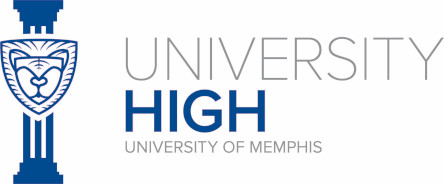Student Academic Experience
University High School offers a rigorous academic experience in all core content areas, allowing students to engage in typical course offerings that meet graduation requirements, while also exploring coursework in their interest areas and potential career pathways. A University High School student will engage in different types of coursework and experiential learning, including:
Core Content & Elective courses taught by University High School faculty and staff
Dual Enrollment Core Content & Elective courses taught by University of Memphis faculty
Online Core Content and Elective courses completed via self-paced asynchronous modules
with in-person support from faculty advisors and school-based instructional aides
Core Content Area Visions
ENGLISH LANGUAGE ARTS
University High School’s ELA courses foster courageous thinkers and confident communicators, not seeking correct answers, but asking big and bold questions. Students in these courses read, analyze, and make meaning of rigorous and profound texts that reflect the identities and experiences of UHS students and the broader Memphis and global community. Students and faculty partner to derive meaning from texts and topics through writing, discourse, and cross-curricular projects and entrepreneurial endeavors. Students develop technological literacy to organize and communicate their ideas using relevant digital and visual software and tools. UHS students are exposed to a wide-variety of text types and genres, ensuring that when students choose the medium to research a topic or make a claim they make efficient and strategic decisions. UHS students are accountable to using independent reading as a means to learn about new content, explore new passions and perspectives, and show proficiency in meeting college-ready proficiencies.
MATHEMATICAL CONCEPTS & PRACTICES
University High Schools students gain fluency with a variety of cognitive and mathematical practices that allow for efficient and strategic decision-making in math. This fluency allows students to consistently demonstrate an effective process for problem-solving within whatever constraints exist in a real-world or abstract task and an ability to make and defend a claim. This fluency and argumentation has a foundation in mastery of the content of Algebra I, Geometry, Algebra II, Calculus, & Statistics. Deep conceptual knowledge and automatic procedural fluency are both prioritized in UHS courses to support students in thinking critically and fluidly in mathematical application. Beyond traditional instruction and assessment, the understanding and application of core content is extended and demonstrated via cross-disciplinary projects that require students to apply mathematical thinking.
SCIENCE, TECHNOLOGY, & ENGINEERING
University High School students will graduate with a firm grasp of the discipline-specific knowledge, analytical skills and literacy skills required to excel in college-level science courses. Science instruction seeks to develop scientific analytical skills (measured by the ACT) including the interpretation of data, scientific investigation, and the evaluation of models, inferences & experimental results.All students master the subjects of Biology, Chemistry, Physics, & Environmental Science, as well as have the option to earn college-credit through dual-enrollment courses, such as Anatomy & Physiology, General Psychology, and Problem Solving for Engineers. UHS students engage in hands-on instructional experiences in state-of-the-art labs and makerspaces across campus, gaining practical experience to support their pursuit of careers in science.
SOCIAL SCIENCES
University High School social science courses aim to help graduates better understand themselves and others they interact with daily and those they may never interact with in their lifetime. The UHS social science programs strive to expand students’ worldview and seeks to include perspectives and voices that have historically been absent from national and world history. As students gain key content knowledge and develop college-level research, writing, and communication skills, they simultaneously build connections, describe and honor differences, and analyze historical fact and narrative through inquiry-based, collaborative instruction. Through the use of historical and contemporary primary and secondary source materials, students develop both the analytical and literacy skills of a historian, while growing into critical consumers of the work of historians - past and present.
A preview of core course offerings:



